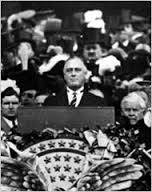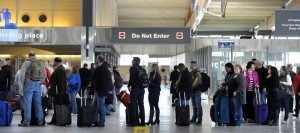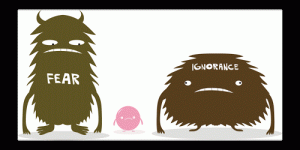Long security lines at O’Hare airport. A plane falls out of the sky flying from Paris to Cairo, possibly the result of a terrorist attack. What do we want–freedom or security? I wrote about this last December . . .
Last Monday a segment of one of the NPR shows I listen to frequently was dedicated to the 73rd anniversary of the Japanese attack on Pearl Harbor, particularly focused on President Franklin Delano Roosevelt’s famous “day that will live in infamy” speech to Congress and the nation that followed the attack on December 7th, 1941.  During the segment, the person being interviewed mentioned a well-known passage from another of FDR’s speeches, his First Inaugural Address in 1933.
During the segment, the person being interviewed mentioned a well-known passage from another of FDR’s speeches, his First Inaugural Address in 1933.
The only thing we have to fear is fear itself—nameless, unreasoning, unjustified terror which paralyzes needed efforts to convert retreat into advance.
In this speech, Roosevelt was drawing his listeners’ attention particularly to the economic fear that paralyzed the nation during the Great Depression. But his words have direct application to our country at the end of 2015—the greatest thing we have to fear is not ISIS, Muslims, immigrants, liberals, conservatives, global warming, Donald Trump, or any of the other people or things that we obsess endlessly about. It is fear itself.
 There is a reason why the first thing angels say when showing up in various places in scripture invariably is “Fear Not.” Because when forced to choose between freedom and safety, human beings invariably prefer the latter. What do people want more, freedom or security? There is an exercise I do with my students frequently when this question comes up in class that never fails to be illuminating, an exercise that begins with my telling them a story. Just four short weeks after 9/11, I was scheduled to give a conference paper in Fort Lauderdale; as it turned out, almost half of the thirty or more scheduled speakers cancelled because they did not feel safe getting on a plane. Security was very tight at the airport in Providence, but I particularly remember the airport in Fort Lauderdale for our return flight. We arrived three hours earlier than we would have normally and needed every bit of those three hours to get through beefed-up security. There were soldiers in uniform with automatic weapons everywhere in the terminal, the security line was moving at a snail’s pace—and no one was complaining.
There is a reason why the first thing angels say when showing up in various places in scripture invariably is “Fear Not.” Because when forced to choose between freedom and safety, human beings invariably prefer the latter. What do people want more, freedom or security? There is an exercise I do with my students frequently when this question comes up in class that never fails to be illuminating, an exercise that begins with my telling them a story. Just four short weeks after 9/11, I was scheduled to give a conference paper in Fort Lauderdale; as it turned out, almost half of the thirty or more scheduled speakers cancelled because they did not feel safe getting on a plane. Security was very tight at the airport in Providence, but I particularly remember the airport in Fort Lauderdale for our return flight. We arrived three hours earlier than we would have normally and needed every bit of those three hours to get through beefed-up security. There were soldiers in uniform with automatic weapons everywhere in the terminal, the security line was moving at a snail’s pace—and no one was complaining.  Indeed, many people went out of their way to thank the soldiers and security personnel for their service and for “keeping us safe.”
Indeed, many people went out of their way to thank the soldiers and security personnel for their service and for “keeping us safe.”
“Suppose,” I ask my students, “you wanted to fly home today and it took you more than three hours to get through security at the Providence Airport. What would your reaction be?” “I’d be pissed!” most of them say. What’s the difference between my experience in October 2001 and now? “People didn’t feel safe then, and they do now.” The takeaway from the exercise, without fail, is that freedom and all of that is great, wonderful, and at the center of our core values—until we don’t feel safe. When we think we are threatened or “under attack,” all bets are off—we are willing to set our core values aside in exchange for guarantees of security. And we will flock to the support of any person or persons who claim to have a strategy for keeping us safe. I am not in the classroom this semester because I am on sabbatical, but if I ran this exercise now, my guess is that students might be more tolerant of beefed-up security before a plane ride home. In the wake of an uninterrupted series of mass killings both abroad and in this country over the past several weeks, we are approaching that tipping point from freedom to security. Iris Murdoch once said that one of the best questions a person can ask is “What are you afraid of?” These days the answer apparently is “everything.” You can smell the fear.
Iris Murdoch once said that one of the best questions a person can ask is “What are you afraid of?” These days the answer apparently is “everything.” You can smell the fear.
Albert Camus wrote in The Plague that the greatest source of evil in the world is ignorance; that case can be made, but I’m convinced that an even greater source of the worst that human beings can be is fear. Despite the best efforts of many, our current political cycle is being driven by a candidate for President who is extraordinarily skillful at building support out of any number of fears both hidden and public. This week Donald Trump proposed that until our leadership “knows what’s going on,” all Muslims should be prohibited from entering the United States. This was just another example of the sort of xenophobic and racist statements that he utters every other day. My concern is not so much Trump himself—I still am hopeful that his candidacy will fall by the wayside—but rather with why he has been the frontrunner for the Republican nomination unbroken for the past several months with no change in sight.  This says a great deal more about the American electorate than about Donald Trump, who makes no secret about who he is. Why is such a person who regularly says things that eat at the heart of our most cherished values attracting noticeable voter support and endless media play?
This says a great deal more about the American electorate than about Donald Trump, who makes no secret about who he is. Why is such a person who regularly says things that eat at the heart of our most cherished values attracting noticeable voter support and endless media play?
Fear. Even FDR was not immune from its tentacles; his internment of Japanese-American citizens during WWII for no reason other than their race is almost universally considered to be one of the darkest blemishes on American history in the 20th century. The day after Donald Trump’s call for banning Muslims from entering the United States, the Anti-Defamation League released the following statement:
In the Jewish community, we know all too well what can happen when a particular religious group is singled out for stereotyping and scapegoating. We also know that this country must not give in to fear by turning its back on its fundamental values, even at a time of great crisis.  As we have said so many times, to do otherwise signals to the terrorists that they are winning the battle against democracy and freedom.
As we have said so many times, to do otherwise signals to the terrorists that they are winning the battle against democracy and freedom.
Amen to that. When faced with evidence of having failed to live up to our hopes and claims, people often say “We’re better than that.” In our current climate, we have to be better than that.
I am not a big fan of the National Anthem. The tune of “The Star-Spangled Banner” is too difficult for anyone but a trained singer to perform well and many of its lyrics are violent and war-mongering. Give me “America the Beautiful” or “My Country ‘tis of Thee” any day. But the final line of the National Anthem is one that all Americans would do well to pay close attention to these days. If we are truly “the land of the free and the home of the brave” as the song claims, then we need to act like it. If freedom for all is our primary value, then we need to embrace courage and reject guarantees of security built on a foundation of fear and denial of freedom for some. We must resist the siren call of those who would play on our fears and the worst angels of our nature. The future of the American experiment is at stake.
If we are truly “the land of the free and the home of the brave” as the song claims, then we need to act like it. If freedom for all is our primary value, then we need to embrace courage and reject guarantees of security built on a foundation of fear and denial of freedom for some. We must resist the siren call of those who would play on our fears and the worst angels of our nature. The future of the American experiment is at stake.











